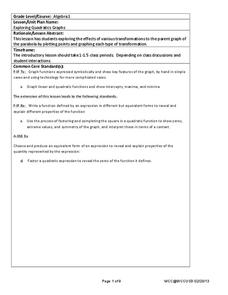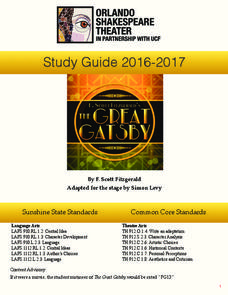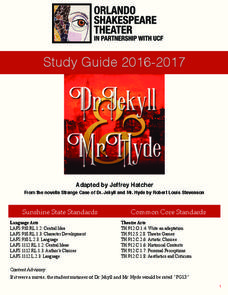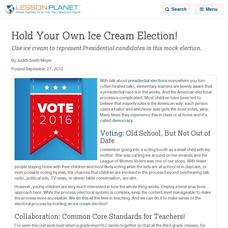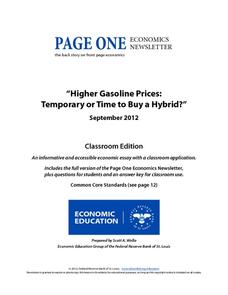West Contra Costa Unified School District
Exploring Quadratics and Graphs
Young mathematicians first graph a series of quadratic equations, and then investigate how various parts of the equation change the graph of the function in a predictable way.
West Contra Costa Unified School District
Shifting Linear Equations in Function Notation
Time for a shift in thinking! Learners examine translations of linear functions. They use function notation to describe the translation and make connections to the graph.
West Contra Costa Unified School District
Scientific Method Mania
Horrible science puns only happen periodically, but the scientific method is forever. Young scientists observe two presentations on the scientific method, complete independent practice worksheets, and integrate their knowledge through a...
West Contra Costa Unified School District
Solving Exponential Equations
The power to solve exponential equations lies in the resource. Scholars first learn how to solve exponential equations. An activity matching cards with equations, intermediate steps, and solutions strengthens this skill.
EngageNY
Nonlinear Models in a Data Context
How well does your garden grow? Model the growth of dahlias with nonlinear functions. In the lesson, scholars build on their understanding of mathematical models with nonlinear models. They look at dahlias growing in compost and...
Kenan Fellows
Math Made Simple as 1-2-3: Simplified Educational Approach to Algebra
Writing an equation of a line is as easy as m and b. A lesson plan presentation gives individuals different strategies for writing equations of lines. Some items provide a slope and a point while others provide two points. Whatever the...
ELA Common Core Lesson Plans
American Romanticism
Nathaniel Hawthorne's "Rappaccini's Daughter" provides the text for an activity that asks readers to select specific passages from the story, identify the aspect of American Romanticism the passage exemplifies, and then provide an...
Orlando Shakes
The Great Gatsby: Study Guide
Uncover the exciting world of the Roaring Twenties with The Great Gatsby study guide. Individuals become critics as they write a review of the production. Scholars also read historical information and analyze the differences between the...
Orlando Shakes
Dr. Jekyll and Mr. Hyde: Study Guide
Can science ever go too far? Learners explore this topic with the Dr. Jekyll & Mr. Hyde study guide. They read about the connection between scientific experimentation in fiction and real life and then compare a scene from the novella...
Orlando Shakes
Henry V: Study Guide
Shakespeare did more than write timeless literary works—he coined words such as moonbeam, fortune-teller, and even eyeball! A study guide for Henry V introduces key words the Bard first used with a fun vocabulary activity, part of a...
Anti-Defamation League
Shirley Chisholm: Unbought, Unbossed and Unforgotten
A 13-page packet introduces high schoolers to a lady of amazing firsts. Shirley Chisholm was the first Black woman elected to Congress, the first Black woman to run for President of the United States, and a leader of the Women's Rights...
Curated OER
Transitional Kindergarten: The Gift of Time
A brief overview of a new class that can be beneficial for young learners.
Curated OER
Hold Your Own Ice Cream Election!
Use ice cream to represent Presidential candidates in this mock election.
Little 10 Robot
Operation Math Code Squad
Your mission, if you decide to accept it, is math skills practice. In this app, Mission Impossible meets basic number operation skills, and your students are the secret agents.
Federal Reserve Bank
What Do Financial Market Indicators Tell Us?
Explain the four categories of financial indicators (commodity prices, stock indexes, interest rates, and yield spreads), and help your class members understand how changes in this data can affect decisions regarding consumer spending,...
Federal Reserve Bank
The Great Inflation: A Historical Overview and Lessons Learned
Your young economists will explore the roots of fears about high inflation by learning the effects of rising prices during the world wars and in particular the Great Inflation of the 1970s.
Federal Reserve Bank
The Legacy of the Olympics: Economic Burden or Boon?
Do the economic benefits of major sporting events such as the Olympics or the World Cup outweigh the expected costs? Using fundamental economic terms, discover the explicit and implicit costs and benefits for countries that host these...
Federal Reserve Bank
Higher Gasoline Prices: Temporary or Time to Buy a Hybrid?
Gasoline prices garner a lot of attention in the United States. What can explain a temporary decline in gasoline consumption, and how do gasoline prices spur innovation in the energy and automotive industries?
Federal Reserve Bank
Wait, Is Saving Good or Bad? The Paradox of Thrift
Could saving really harm the economy? Discover the paradox of thrift and how decreases in consumption can affect economic recovery and various markets and industries.
Federal Reserve Bank
Why Scarce Resources Are Sometimes Unemployed
Why do markets operate inefficiently when the world's resources are so limited? Review the various types of unemployment that exist and why some resources, especially human resources, go unused.
Federal Reserve Bank
Investing in Yourself: An Economic Approach to Education Decisions
What is the difference between physical capital and human capital, and in which should you invest? While considering the concept of return on investment, take a look at the payoffs and consequences of investing in training and education.
Federal Reserve Bank
Prices: The Marketplace’s Communication System
Explore the dual role of prices as signals and incentives, and discover how prices are determined by buyers and sellers in the United States economy.
Federal Reserve Bank
The Output Gap: A‘Potentially’ Unreliable Measure of Economic Health?
How can we accurately estimate what the economy should produce now and in the future? Have your pupils tackle this question as they learn about real versus potential GDP and as they review data regarding the output gap in the United States.
Federal Reserve Bank
Choices Are Everywhere: Why Can’t We Just Have It All?
Here is a resource covering a range of terms and concepts regarding scarcity, opportunity cost, and government debt in economics.


